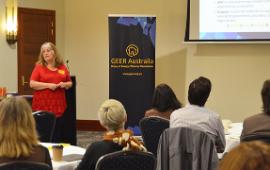Aboriginal tenants at an energy related disadvantage

In Summary
- Swinburne research finds that many aboriginal tenants are subject to sub-optimal living conditions due to homes with low energy efficiency
- Senior Lecturer in Marketing Dr Rowan Bedggood founded the Group of Energy Efficiency Researchers (GEER) to improve energy-related wellbeing in households and communities
Old, run-down rental properties are putting Aboriginal tenants at an energy related disadvantage, Swinburne research shows.
Swinburne senior marketing lecturer Dr Rowan Bedggood conducted a study on the living conditions of Aboriginal people in Victoria showing that only 19 per cent of Aboriginal tenants have wall insulation, while 36 per cent of Aboriginal tenants have no insulation at all.
These findings are especially important as it is reported that 86 per cent of Aboriginal families live in rental properties, and 67 per cent of these properties were built more than 20 years ago.
Adequate insulation ensures heat is retained during winter. Conversely, poor insulation leads to either largely increased energy bills, or sub-optimal living conditions.
Taking responsibility
Dr Bedggood says the landlords of these properties need to take responsibility for the energy related problems of their properties.
“Landlords, commonly, are not interested in spending the funds to upgrade their investment properties, or to provide maintenance,” says Dr Bedggood.
“This is shocking when we consider that a portion of these homes are owned by state or commonwealth governments.”
The research concludes that Aboriginal families living in rental properties are unable to improve the energy efficiency of their homes for two reasons:
- An inability to modify home structures,
- An inability to upgrade home appliances.
Solving the problem
Dr Bedggood says that a possible solution is to introduce new laws which would ensure that rental properties are energy efficient.
“One way of addressing this is to introduce legislation requiring landlords to ensure their properties reach a minimum energy efficiency standard,” she says.
“Currently, there is no standard for existing homes.”
In 2016 Dr Bedggood founded the Group of Energy Efficient Researchers (GEER) to address energy related issues affecting Australian communities.
“GEER’s purpose is to improve the energy-related wellbeing in households and communities through collaborative research,” she says.
“Our research and activities focus on energy efficiency relating to quality of life, affordability and environmental sustainability.”
GEER hosted a round-table discussion earlier this month to develop ideas about what can be done to improve the lives of householders experiencing energy hardship.
Dr Bedggood is confident the response to the round-table event is a good sign for the future.
“The response to our round table event was extremely positive, and we have many more who could not make it but want to be involved, there are many who want to see this (energy crisis) turned around.”
Dr Bedggood’s research ‘The living conditions of Aboriginal people in Victoria’, has been published in Energy Procedia, Vol. 121 (Sep 2017), and can be viewed online at ScienceDirect.
To learn more about the Group of Energy Efficient Researchers and their mission, visit the GEER Website.

